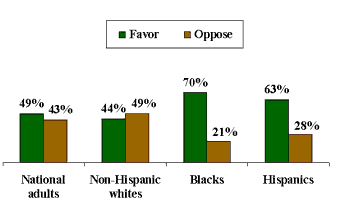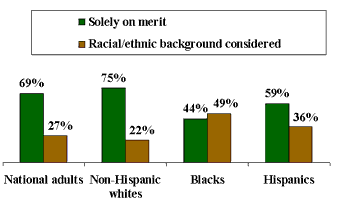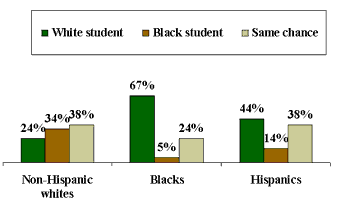GALLUP NEWS SERVICE
PRINCETON, NJ -- The United States Supreme Court ruled on Monday that minority applicants can be given an edge when applying to colleges and universities, but only a very narrow edge. The court ruled that the University of Michigan's point system, used to determine which students should be admitted, is unconstitutional because it gives too much of a boost to applicants' chances simply on the basis of their race. The university's law school, however, uses a less structured system to encourage minorities to apply, and the court ruled this system constitutional.
The latest Gallup Poll finds Americans generally divided on affirmative action programs for minorities, but substantially opposed to any program that may give minorities a clear edge in college admissions -- perhaps even the slight edge that the Supreme Court would grant.
Blacks and Hispanics are much more in favor of affirmative programs than are whites. When given a specific choice, Hispanics prefer merit-only admission programs over those that give some edge to promote minority enrollment, and blacks are about evenly divided on this issue.
General Support for Affirmative Action
The poll, conducted June 12-18, finds more Americans favor than oppose (49% to 43%) "affirmative action programs for racial minorities."
These views are highly related to race and ethnicity. Whites lean against such programs (44% in favor, 49% opposed), while blacks and Hispanics favor these programs by substantial majorities -- by 70% to 21% among blacks, and 63% to 28% among Hispanics.
| Do you generally favor or oppose affirmative action programs for racial minorities? |
 |
| June 12-18, 2003 |
Promoting Diversity in College Admissions
However, Americans' views on affirmative action appear much different when seen in greater detail. Sixty-nine percent of Americans say college applicants "should be admitted solely on the basis of merit, even if that results in few minority students being admitted," while only 27% say an applicant's racial background should be taken into consideration, "even if that means admitting some minority students who otherwise would not be admitted."
Among whites, support is even greater for the merit-only program -- 75% to 22%. Despite their support for affirmative action programs in general, Hispanics express majority support for the merit-only admissions programs by 59% to 36%. Blacks are closely divided on this issue. Forty-four percent choose the merit-only admissions programs, while 49% are in favor of admissions that also consider an applicant's racial and ethnic background.
| Which comes closer to your view about evaluating students for admission into a college or university – applicants should be admitted solely on the basis of merit, even if that results in few minority students being admitted, or an applicant's racial and ethnic background should be considered to help promote diversity on college campuses, even if that means admitting some minority students who otherwise would not be admitted? |
 |
| June 12-18, 2003 |
Perception of Bias Differs Among Races
One reason whites may be less supportive of affirmative action programs is that they are much less likely to perceive racial bias than are blacks and Hispanics. When asked who would have a better chance of being accepted to a major college or university -- a qualified white or an equally qualified black applicant -- white respondents chose the black student by 34% to 24%, with 38% saying they have an equal chance of being admitted. Black respondents, on the other hand, said the white student would have the better chance -- by 67% to 5% -- with another 24% saying the candidates had an equal chance.
| If two equally qualified students, one white and one black, applied to a major U.S. college or university, who do you think would have the better chance of being accepted to the college – the white student, the black student – or would they have the same chance? |
 |
| June 12-18, 2003 |
Hispanic respondents are more likely to see bias than the whites, but less likely than the blacks -- believing the white student has a better chance of gaining admission by a 44% to 14% margin.
Another way to look at the data is that only 29% of blacks believe that blacks' chances of getting into college are just as good or better than whites'. By contrast, 52% of Hispanics say blacks' chances are just as good or better, and 72% of whites feel that way.
Survey Methods
Results are based on telephone interviews with 1,385 national adults, aged 18+, conducted June 12-18, 2003, including oversamples of blacks and Hispanics that are weighted to reflect their proportions in the general population. For results based on the total sample of national adults, one can say with 95% confidence that the maximum margin of sampling error is ±3 percentage points.
Results for the sample of 821 non-Hispanic whites, aged 18+, are based on telephone interviews conducted June 12-15, 2003. For results based on the total sample, one can say with 95% confidence that the margin of sampling error is ±4 percentage points.
Results for the sample of 241 blacks, aged 18+, are based on telephone interviews conducted June 12-18, 2003. For results based on the total sample, one can say with 95% confidence that the margin of sampling error is ±7 percentage points.
Results for the sample of 266 Hispanics (including 12 Hispanic respondents who identify their race as black), aged 18+, conducted June 12-18, 2003. For results based on the total sample, one can say with 95% confidence that the margin of sampling error is ±7 percentage points. (Fifty-three out of the 266 interviews with Hispanics were conducted in Spanish).
In addition to sampling error, question wording and practical difficulties in conducting surveys can introduce error or bias into the findings of public opinion polls.
26. Do you generally favor or oppose affirmative action programs for racial minorities?
|
Favor |
Oppose |
No opinion |
|
|
% |
% |
% |
|
|
National Adults |
|||
|
2003 Jun 12-18 |
49 |
43 |
8 |
|
2001 Jun 11-17 |
47 |
44 |
9 |
|
Men |
|||
|
2003 Jun 12-18 |
47 |
48 |
5 |
|
2001 Jun 11-17 |
43 |
48 |
9 |
|
Women |
|||
|
2003 Jun 12-18 |
51 |
39 |
10 |
|
2001 Jun 11-17 |
51 |
40 |
9 |
|
Non-Hispanic Whites |
|||
|
2003 Jun 12-15 |
44 |
49 |
7 |
|
2001 Jun 11-17 |
44 |
48 |
8 |
|
Blacks |
|||
|
2003 Jun 12-18 |
70 |
21 |
9 |
|
2001 Jun 11-17 |
69 |
23 |
8 |
|
Hispanics |
|||
|
2003 Jun 12-18 |
63 |
28 |
9 |
|
2001 Jun 11-17 |
64 |
23 |
13 |
38. Which comes closer to your view about evaluating students for admission into a college or university – [ROTATED: applicants should be admitted solely on the basis of merit, even if that results in few minority students being admitted (or) an applicant's racial and ethnic background should be considered to help promote diversity on college campuses, even if that means admitting some minority students who otherwise would not be admitted]?
|
|
Racial/ethnic background |
|
|
|
% |
% |
% |
|
|
National Adults |
|||
|
2003 Jun 12-18 |
69 |
27 |
4 |
|
Men |
|||
|
2003 Jun 12-18 |
71 |
25 |
4 |
|
Women |
|||
|
2003 Jun 12-18 |
67 |
29 |
4 |
|
Non-Hispanic Whites |
|||
|
2003 Jun 12-15 |
75 |
22 |
3 |
|
Blacks |
|||
|
2003 Jun 12-18 |
44 |
49 |
7 |
|
Hispanics |
|||
|
2003 Jun 12-18 |
59 |
36 |
5 |
39. If two equally qualified students, one white and one black, applied to a major U.S. college or university, who do you think would have the better chance of being accepted to the college – [ROTATED: the white student, the black student]– or would they have the same chance?
|
White student |
Black student |
Same chance |
No opinion |
|
|
% |
% |
% |
% |
|
|
National Adults |
||||
|
2003 Jun 12-18 |
31 |
29 |
36 |
4 |
|
Men |
||||
|
2003 Jun 12-18 |
28 |
30 |
38 |
4 |
|
Women |
||||
|
2003 Jun 12-18 |
34 |
27 |
35 |
4 |
|
Non-Hispanic Whites |
||||
|
2003 Jun 12-15 |
24 |
34 |
38 |
4 |
|
Blacks |
||||
|
2003 Jun 12-18 |
67 |
5 |
24 |
4 |
|
Hispanics |
||||
|
2003 Jun 12-18 |
44 |
14 |
38 |
4 |
